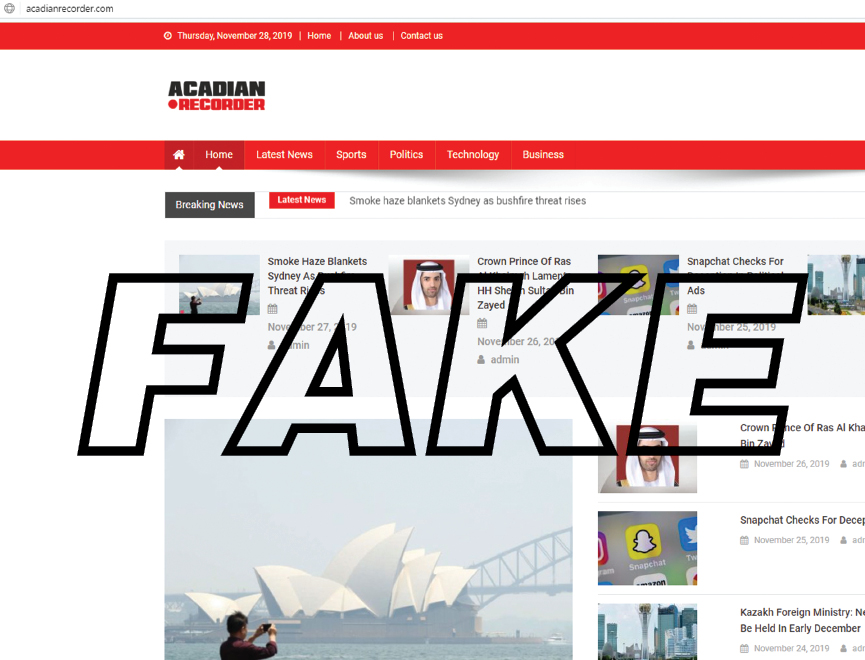
 Print
Fake Canadian news sites that push a pro-Indian government position internationally
11-27-2019
Last week CBC News reported that “A huge international network of fake local news sites that push a pro-Indian government position internationally has a deep Canadian connection.”
According to CBC News article, a Brussels based non-profit group, EU Disinfolab “whose goal is identifying disinformation targeting the European Union, the network includes at least 265 sites in more than 65 countries.”
CBC News identified at least 12 sites mimicking as Canadian news outlets, “such as The Toronto Evening Telegram.”
CBC News further identified “further 16 sites designed to look like local Canadian news websites, all registered by the Srivastava Group.”
According to CBC News “All of the sites are tied to the Srivastava Group, an Indian corporation run by Ankit Srivastava, a self-described entrepreneur based in New Delhi. CBC was able to determine using website data analysis tool DomainTools. Some of the websites were registered to a bungalow in Edmonton. The network of sites publishes content that is critical of Pakistan.”

“Alexandre Alaphilippe, executive director of the EU DisinfoLab, notes that parts of this network have been active since 2010. "It's a network that has been operating for a very long time on these questions, promoting India or denigrating Pakistan," he said. "It's not only fake media sites. They have think-tanks, NGOs and so on. It's very organized. It shows that this is something that is planned."
What is troubling, the CBC News reported that Mr. Srivastava “has links to former Liberal MP Mario Silva; the IP address used to register the website of a think-tank that was chaired by Silva is the same as that of the Srivastava group, and the site is hosted on a server administered by Srivastava.”
Not only that. According to CBC, Mr. Silva “has given interviews to” these fake news websites such as “Times of Geneva, the New Delhi Times and 4News Agency, some of which were critical of Pakistan.”
Mr. Srivastava other Canadian connection is the freelance writer, Mr. Tarek Fatah, a Pakistani-Canadian, known for his criticism of Pakistan and Islam in general. Mr. Fatah’s articles published in mainstream Canadian media outlets, such as Toronto Sun were also being republished on fake news website controlled by Srivastava Group.
“In an interview with CBC News, Fatah said that he was aware his columns were being republished in the New Delhi Times and said Srivastava paid him a small fee for it, though he declined to specify how much.”
This matter was highlighted by AlAmeen post to raise awareness about the spread of online fake news against Pakistan.
There is also an online petition asking the Trudeau Government to clampdown on such fake news outlets that are being operated from Canada, or registered in Canada, and further investigate high level media and political Canadian connections with well-organized anti-Pakistan propaganda groups operating in Canada disguised as NGO or public think-tanks.
Muhammad Afzal Malik responded on AlAmeen Facebook post, ”The Pakistani Canadian Associations operating in Canada must take legal actions against such persons and organizations engaged in anti Pakistan propaganda damaging reputation and integrity of Pakistan and Pakistani community.
Community leadership must play its effective role in stopping such subversive propaganda.”
In todays fast-paced social media and information age, no one is immune from being affected by it. Fake news spreads rapidly due to several reasons – the content or nature of the news especially the component of “Fear” associated with such fake news. Even those at the helm of information technology, such as Google, Facebook, Twitter often find out, after the damage is done, such as the shooter in New Zealand’s mosque this year telecasting his killing rampage live on Facebook. It was sometimes before Facebook was able to stop the live telecast.
Back in February the military stand-off between India and Pakistan after a suicide bomber blew up a bus of paramilitary troops in Pulwama, Kashmir. LA Times published and article, “Back Story: When India Pakistan Clashed, the Fake News Won.” The article highlights how pictures of troops killed in the attack spread throughout India. The article points out, “But many of the pictures and videos that went viral weren’t from the attack.”

Reuters pointed out the spread of fake news during the stand-off at the highest government level. In an article, “Social media fake news fans tension between India and Pakistan” Reuters reported that “A Facebook group that says it supports Amit Shah, the chief of India’s ruling Bharatiya Janata Party (BJP), posted images on Tuesday of the alleged destruction caused inside Pakistan by the Indian air strike. Alt News said the pictures were from a 2005 earthquake in Kashmir.”
“To Stop Fake News, Online Journalism Needs a Global Watchdog.” An article published by foreignpolicy.com states. “Without regulations that push search engines and social media companies to prioritize reliable and truthful sources of information, propaganda and censored content will dominate digital platforms.”
However, nothing beats due diligence at an individual level.
At times often involuntarily, we avail ourselves as the very tools in the spread of fake news. Quiet often we simply start forwarding messages on WhatsApp, start sharing posts on Facebook, or retweeting Tweets that are blatantly false without checking facts.
We believe, just like charity begins at home, so does the spread of fake news. We all need to be more vigilant about the stuff we share, forward, or retweet.
Not only that. We need to learn to identify fake news and report it, rather than leaving for others to do it. This would be the most instrumental way to stop the spread of fake news.
We also need to persuade our lawmakers at all levels of governments to take the matter of fake news more seriously and pass laws and policies to address the issue of fake news and its rapid spread.
Currently, other than some dedicated individuals, and NGO’s whom have taken upon themselves to tackle the issue of fake news, by becoming watchdogs. No such effort is being organized at government level. We need to compel our government to take concrete steps in this direction.
In a world of rapid spread of misinformation, every citizen has an obligation to safeguard our collective interests by being vigilant and reporting fake news and misinformation to the authorities or to the social media hosting such misinformation. Until the lawmakers wake up to the reality and start making laws. The only way to combat the spread of fake news is being vigilant about it.
Footnotes:
|